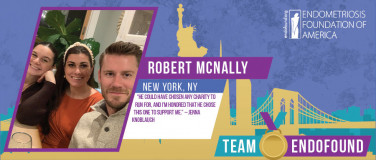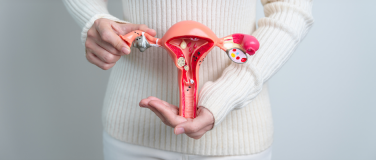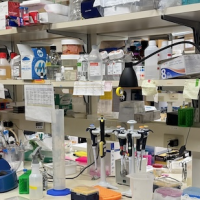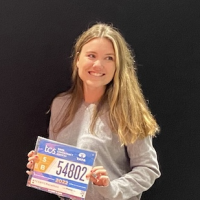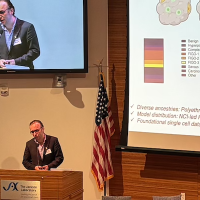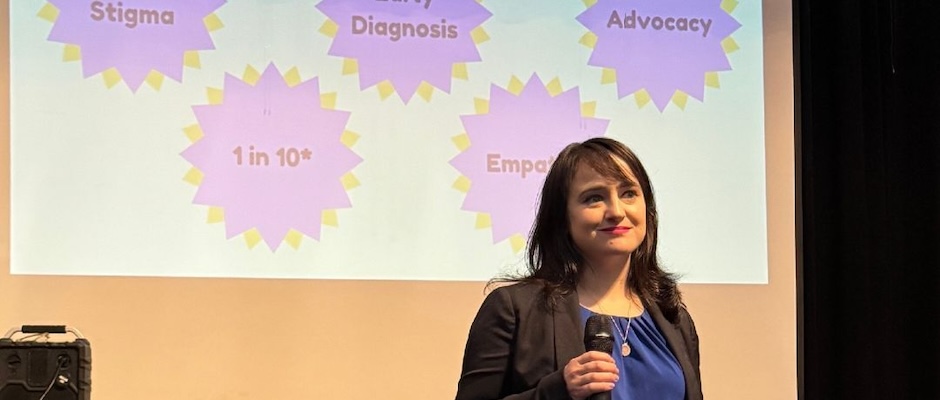
On May 8, Mara Wilson returned to the auditorium at Dolores Huerta Middle School in Burbank, California, where she had been a student 25 years prior. The actress and writer was there with three other ENPOWR educators to teach approximately 300 seventh graders about endometriosis. Wilson and the team provided information on the disease, shared personal stories about their journeys with it, and answered questions at the end of the presentation that the students had written anonymously on index cards.
One card, in particular, struck a chord with Wilson.
“It had some doodles on it, like cartoon characters,” Wilson recalled. “But then, in very small print in the corner, it said, ‘I have all of these symptoms, what do I do?’ They were probably too nervous and didn’t want friends to see what they were writing, so they did some drawings as a distraction.
“That reminded me so much of what I was like at that age,” Wilson continued. “I tried to laugh things off and pretend like everything was okay. I didn’t want everybody to know the physical and emotional pain I was going through with my periods. Seeing that card broke my heart because I knew what they were feeling. It’s exactly what I would have said had someone given me that presentation in seventh grade. But it also warmed my heart to know that we were the people they felt they could reach out to.”
Wilson works primarily as a voice actor today, having narrated several audiobooks over the past few years. She is known to many for her roles as Natalie Hillard in the 1994 Golden Globe-winning comedy film Mrs. Doubtfire and as Matilda in the 1996 movie by the same name. The presentation at her alma mater was her first as an ENPOWR educator. She is one of dozens from coast to coast who have taken on that role, committed to spreading awareness about endometriosis and helping young girls with symptoms receive the diagnosis and care they need and deserve.
The Power of ENPOWR
ENPOWR—ENdometriosis: Promoting Outreach and Wide Recognition—was founded in 2013 with a New York state grant secured by EndoFound co-founder Padma Lakshmi. The program played a crucial role in the passage of a 2019 New York State law that made educational materials about endometriosis available in schools. ENPOWR provides those and other menstrual health education resources, including access to trained volunteer educators. The program’s goals are to:
-
Disseminate comprehensive and age-appropriate endometriosis education to middle and high school students nationwide.
-
Address menstruation stigma by fostering widespread education and open discussions about the prevalence and impact of endometriosis.
-
Empower students to proactively seek appropriate care when needed, equipping them with self-advocacy skills and resources for tracking symptoms.
ENPOWR began as a pilot program for New York State (where EndoFound is headquartered) that had educated more than 38,000 students across the U.S. and in seven countries by 2020. When the program came to a halt due to the COVID-19 pandemic, EndoFound seized the opportunity to update its program content and infrastructure, improve scalability by allowing more classrooms and volunteers to participate, and leverage advancements in educational technology. In December 2023, ENPOWR relaunched with a national focus, featuring new print materials, videos, an online course, and a streamlined system for volunteering.
In the past 18 months, ENPOWR has partnered with 61 middle schools and high schools in 17 states. ENPOWR educators have delivered 95 presentations to nearly 5,000 students, and an additional 600 students have completed the program’s e-course. ENPOWR has also distributed tens of thousands of print materials to schools during that time, which are usually hung in nurses’ offices, health classrooms, or restrooms.
“I just recently shipped out 25 pounds of educational materials to various schools, including some posters and pamphlets, to a teacher who has endometriosis and wants teens to be informed. We can do that for any school that wants them,” said Carolyn Mayer, EndoFound’s program director, who has led the relaunch and is overseeing the nationwide expansion of ENPOWR.
Mayer also gives several presentations to schools each year, either on her own or in tandem with volunteer educators.
“I’ve learned that this generation of kids is so different than previous ones because of their exposure on social media to things like periods and endometriosis, but also because of their willingness to talk about these things,” Mayer said. “It’s very hopeful in the way students are responding to us.”
According to surveys administered to students before and after each presentation over the past 18 months, the percentage who said they feel endometriosis is a “Very important” health issue (a five on a scale of one to five) increased from 36 percent before the presentation to 76.1 percent after. When asked to rate on a scale of one to 10 how comfortable they were discussing menstrual periods, the rate increased from 7.8 to 9.2.
The surveys also revealed that 55.7 percent of female students said they experience diarrhea, nausea, vomiting, leg pain, or heavy bleeding during their periods. And when asked if they or someone they know is experiencing endometriosis symptoms, 21 percent said “Yes, someone I know,” 13.6 percent said “Yes, I am personally,” and 3.7 percent said “Yes, both myself and someone I know.” While the educators don’t recommend specific doctors to students, they will instruct them on how to find a doctor, what questions to ask, what information to gather and bring to a doctor, and how to seek a second opinion if a doctor dismisses them.
All of this feedback has reinforced the impact ENPOWR has had since the relaunch.
“All of our volunteers are such passionate individuals. Working with them is one of my favorite parts of my job,” Mayer said. “They’re taking matters into their own hands and changing the climate by spreading endometriosis awareness in their local communities.”
“So You Mean to Say It’s Not Normal…?”
ENPOWR educators and those who open their doors to them come from many backgrounds. Several have endometriosis. Some are connected to someone who has it. Others, such as teachers, know or work with people who might benefit from the education.
Eric Levine is a health teacher at Benjamin N. Cardozo High School in Queens, New York, and an adjunct health professor at Nassau Community College. He invited ENPOWR speakers to both schools during ENPOWR’s early years and asked them to return last year after learning about the program’s relaunch.
“We have a lot of people at the college and high school, students and staff, who have never heard of endometriosis,” Levine said. “I’ve also had a lot of students experiencing discomfort or heavy period pain and missing school because of their periods. This seemed like a presentation that would be very appropriate. How can we help our students? That’s really what it’s all about.”
Mayer presented two classes this year at the college in Levine’s human sexuality class—one in person in April and another virtually in July. She and another local ENPOWR educator, Izzy Wegner, each taught five health classes at the high school one day in May, reaching more than 300 juniors and seniors. This school year, ENPOWR will return to teach sophomores and juniors.
Mayer was impressed by the Cardozo students’ engagement. While some used the anonymous index cards to ask questions, others weren’t shy about sharing their experiences openly in front of their peers.
“In one particularly outspoken class,” Mayer recalled, “a female student asked, ‘So you mean to say it’s not normal to throw up and have diarrhea every time you have your period?’ I was surprised by how candid she was, but even more impressed by the way her classmates responded. No one laughed, no one whispered. Everyone listened seriously and with maturity. It was clear that the students understood the significance of the topic and were gaining tools to continue these conversations with friends, loved ones, and healthcare providers.”
“Students said it was one of the best presentations of the year,” Levine added. “They learned a lot about a topic that I can’t cover in depth. I might mention it as part of the curriculum, but with this much detail? No. That’s why it’s great that ENPOWR came in and why I believe so many other schools would benefit from the program.”
Levine and Mayer said even the boys were attentive.
“This is someone who could be their girlfriend, wife, mother, or sister,” Levine said. “Anything we can present to all students is great because they can learn from each other and be more empathetic. I told them, ‘You may not think this applies to you, but there might be someone in your life who it does apply to, so pass it along.’”
Finding Purpose for Her Pain
Samantha Edgington, 22, began feeling endometriosis symptoms a decade ago with her first menstrual period at her middle school in Glastonbury, Connecticut.
“I was missing school with every cycle,” she said. “I also played water polo and swam, so trying to navigate that when I was in a swimsuit all day and every day was really hard as a young girl.”
Edgington said doctors repeatedly told her then and throughout high school that her periods were normal.
“My symptoms progressively got worse, but nobody listened to me,” she said. “I tried a bunch of birth controls and pain medications, and nothing helped. Doctors told me I was being dramatic, so I took that to heart and shut up about it.”
Edgington moved to Los Angeles in 2021 to attend Occidental College, where she would study biochemistry and play water polo. Her health continued to deteriorate.
“I thought maybe it was the student-athlete life where I was pushing my body way too much in the pool every day and was too stressed from studying,” Edgington said. “I eventually found a new OBGYN who took my pain seriously and said, ‘No, I think you have endometriosis.’”
The doctor was correct. Edgington had surgery in the summer of 2023.
“The endometriosis was on my uterus, one of my ovaries, one of my fallopian tubes, my bladder, my urethra, my renal area, and my bowel,” Edgington said. “I’m so much better today. My symptoms haven’t gone away completely, but they have definitely lessened. I think a big part of all of this was knowing that I wasn’t crazy. My pain was real. And if I have a flare now, I know why, and I know how to treat it and take care of my body.”
Soon after Edgington’s recovery from surgery and with a desire to help other women, she contacted EndoFound to volunteer. Edgington joined EndoFound’s College Ambassador Program, which enabled her to set up a table about endometriosis during her college’s health fairs, essentially making her an ENPOWR educator on her campus. She was also part of Wilson’s team that presented in May at Dolores Huerta, where she encouraged students who were interested in science to realize the positive impact they can have by entering that field.
“I told them, ‘If you want to be a scientist, solve endometriosis. Or solve all of these other women’s health issues because someone has to, and it can be you,’” Edgington said. “My whole experience speaking to those middle school students was so powerful for me. I needed this presentation at their age because, at that point, I was already being gaslit by medical professionals who told me that my period was normal and I was being dramatic. I wish someone had sat me down and said, ‘No, this is not normal. Keep fighting for answers at this young age so it doesn’t take you 10 years to get your diagnosis.’”
Full Circle for Mara Wilson
It was Wilson’s idea to bring ENPOWR to Dolores Huerta. The stage she presented on in May was the same one where she took improv classes and sang in the choir as a student from 1998 to 2001. The school has an annual award named for her mother, who was heavily involved in the PTA and the surrounding community before her passing in 1996, when Wilson was just eight years old. It’s also where Wilson’s endometriosis journey began.
“I got my period in seventh grade, and it was horrific. It was so incredibly painful,” she said. “There were times when I had to be sent home from school because of cramps. I also had anxiety, which got so much worse during my periods—and it was no wonder, considering the horrible things that were happening to my body. I had other friends, too, who were suffering through it, some with pain worse than mine.”
As miserable as Wilson’s periods were, she was too shy to talk about them.
“I told the students [at the start of the presentation] that I was a big talker when I was in middle school. I even got ‘excessive talking’ on my report card. But the one thing I could never, ever talk about was my period,” Wilson said. “I think part of it was that I had a single father and three brothers. They were kind and open-minded, but I felt it wasn’t on them, it was on me. I felt as if my period were something to be ashamed of.”
Wilson said she and her friends who were suffering covertly helped each other get through each school day.
“We would joke when one of us needed a pad or tampon or Midol,” she said. “We would pretend that we were either spies or drug dealers, like, ‘Here’s the contraband! Here’s the stash!’ We’d joke about it because we felt like we had to keep it hidden.”
Wilson opened her talk by sharing some of those personal experiences.
“I told them that I was sharing this with them now because it took me 20 years to get any help, and I didn’t want that to happen to any of them,” Wilson said. “I explained what my symptoms were and how it wasn’t only bad cramps, but it also affected other parts of my body—my bladder, my digestive system, my ovaries, and my appendix to the point where I thought I had appendicitis.”
Wilson and the other educators went through a series of slides that explained endometriosis and the statistics surrounding the disease. They answered questions and offered advice to students, including the one who doodled on her index card. They were also cognizant of keeping the boys engaged, not just by telling them that they know or will know someone with endometriosis one day, but that they can be part of the solution.
“I asked them, ‘Even if you’re not a girl, even if you don’t have a uterus, how many of you here have thought about being doctors, nurses, or scientists? And several hands went up,” Wilson said. “I told them that we need people like that who know about endometriosis, want to study endometriosis, and want to help people with endometriosis.”
Despite being an actress, Wilson admitted that she had some stage fright before the presentation.
“It was nerve-wracking. Honestly, is there a tougher crowd than a group of middle schoolers?” Wilson asked. “I don’t think so.”
But she said the students made it easier for her, echoing what Mayer said about this generation of kids.
“I think the kids there are a lot more mature than we were in my day,” Wilson said. “I told them that I knew this was something that can be embarrassing to talk about, but I will say that, happily, this generation is a lot more open about it. Had I done this in 1999, 2000, or 2001, there would have been dead silence or giggles. The kids we presented to were smart, respectful, and informed. They listened. It was a great experience, and I’m glad we could get this message to them while they’re young.”
ENPOWR is seeking more educators in all states to carry out its mission. Wilson plans to do it again, and she encourages anyone seeking a way to get involved with EndoFound to consider joining her and the hundreds of other ENPOWR educators.
“The first thing we say to the students is, ‘We’re here to talk about periods, and that can be scary and embarrassing to talk about at your age.’ But young people are vulnerable and insecure, and I think when you acknowledge that vulnerability and insecurity right off the bat, they understand and will listen,” Wilson said. “I left that day thinking that I got through to them, that I made a difference. And by helping them, I felt, in a way, that I was helping myself—like I was reaching back through time, making peace with my 12-year-old self, saying, ‘It’s going to be okay.’”
To learn more about ENPOWR and to get involved, visit www.endofound.org/enpowr. And if you're an educator, school nurse, or school administrator, sign your school up for ENPOWR resources here: https://www.endofound.org/sign-up-your-school.







.jpg?v=1?d=4)
